Blair Collection > Critical dissertations on the origin, antiquities, language, government, manners, and religion, of the antient Caledonians, their posterity the Picts, and the British and Irish Scots
(40)
Download files
Complete book:
Individual page:
Thumbnail gallery: Grid view | List view

2 On the Remote
However abfurd the credulity and romance of
antiquity may appear to us, it is both ungenerous
and unfair to turn them to fevere ridicule, without
firfl attending to our own weaknefTes : on a com-
parifon of both, it may be difficult to determine
who is the greatefl objed of contempt ; the brave
Barbarian, intoxicated with the bloody atchieve-
ments, and ideal antiquity of his nation, or the
civilized fceptic, refined into a difbelief of every
truth, and equally removed from the partialities
and fuperior virtues of the heart.
National pride, an attachment to the mar-
vellous, and eafinefs of aflent, are the ftrong cha-
raderillics of mankind in their illiterate flate.
Hence it is, that, in their earlier periods, almoft
all the nations of the earth have ardently vied with
each other, in the invention and belief of the moft
pompous and incredible talcs, with regard to their
origin and antiquity. A Hiort furvey of the anti-
quities of the moft confiderable nations of antient
and later times, will eftablilh the truth of this ob-
fervation.
To begin with the Romans, a people whom
national dignity and fuperiority have defervedly
placed at the head of mankind. — Lucretius, Vir-
gil, Horace, and what is more furprifmg, Saluft,
Livy, Dionyfius HalicarnaiTus, and almoft all the
fucceeding hiftorians, hold forth with one voice
that the Romans were defcended from y^neas ;
but the connedion between that people and the
Phrygian demi-god was no more than a perfedl
chimera. Homer's authority, together with the
convincing arguments of a writer of great erudi-
tion [ill, ^^^^^ ^^^ ^^^'^ matter in the cleareft light.
\ji'] Sec Bochart's Letter to Segrois.
Homer
However abfurd the credulity and romance of
antiquity may appear to us, it is both ungenerous
and unfair to turn them to fevere ridicule, without
firfl attending to our own weaknefTes : on a com-
parifon of both, it may be difficult to determine
who is the greatefl objed of contempt ; the brave
Barbarian, intoxicated with the bloody atchieve-
ments, and ideal antiquity of his nation, or the
civilized fceptic, refined into a difbelief of every
truth, and equally removed from the partialities
and fuperior virtues of the heart.
National pride, an attachment to the mar-
vellous, and eafinefs of aflent, are the ftrong cha-
raderillics of mankind in their illiterate flate.
Hence it is, that, in their earlier periods, almoft
all the nations of the earth have ardently vied with
each other, in the invention and belief of the moft
pompous and incredible talcs, with regard to their
origin and antiquity. A Hiort furvey of the anti-
quities of the moft confiderable nations of antient
and later times, will eftablilh the truth of this ob-
fervation.
To begin with the Romans, a people whom
national dignity and fuperiority have defervedly
placed at the head of mankind. — Lucretius, Vir-
gil, Horace, and what is more furprifmg, Saluft,
Livy, Dionyfius HalicarnaiTus, and almoft all the
fucceeding hiftorians, hold forth with one voice
that the Romans were defcended from y^neas ;
but the connedion between that people and the
Phrygian demi-god was no more than a perfedl
chimera. Homer's authority, together with the
convincing arguments of a writer of great erudi-
tion [ill, ^^^^^ ^^^ ^^^'^ matter in the cleareft light.
\ji'] Sec Bochart's Letter to Segrois.
Homer
Set display mode to: Large image | Transcription
Images and transcriptions on this page, including medium image downloads, may be used under the Creative Commons Attribution 4.0 International Licence unless otherwise stated. ![]()
| Permanent URL | https://digital.nls.uk/76287051 |
|---|
| Description | A selection of books from a collection of more than 500 titles, mostly on religious and literary topics. Also includes some material dealing with other Celtic languages and societies. Collection created towards the end of the 19th century by Lady Evelyn Stewart Murray. |
|---|
| Description | Selected items from five 'Special and Named Printed Collections'. Includes books in Gaelic and other Celtic languages, works about the Gaels, their languages, literature, culture and history. |
|---|

